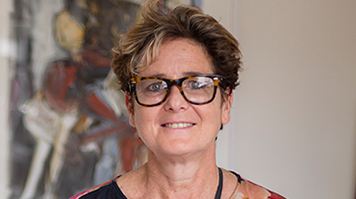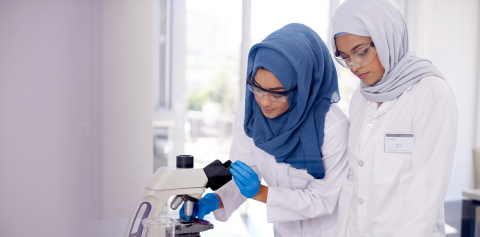The PhD target timeline is three or five years to thesis submission - depending on whether you choose full or part-time – plus an additional year for assessment and ratification.

Research degrees
The ideal stepping stone to doctoral research that develops knowledge and experience.- Home
- Study
- Postgraduate
- Research degrees
Make real world impact
Become an expert in your subject with transferable skills including self-discipline, analytical and critical thinking. Plus, you'll have the ability to turn criticism of others' work into something constructive of your own.
Why study with us?
Research degrees at London South Bank University (LSBU) are highly competitive due to our commitment to excellence, innovation, and impactful research. With a focus on applied research and practical solutions, LSBU cultivates researchers who make meaningful contributions to their fields and society.
Being situated in one of the world's leading academic and cultural hubs, our university location offers unparalleled access to a wealth of resources, including libraries, archives, museums, and research institutions, enriching the research experience. Additionally, proximity to numerous industry headquarters and organisations facilitates collaborations, internships, and networking opportunities, enhancing the relevance and impact of research projects.
At LSBU, we offer a dynamic research environment supported by world-class facilities, renowned academic staff, and strong industry partnerships. Our research programs are designed to foster intellectual curiosity, critical thinking, and interdisciplinary collaboration, equipping students with the skills and knowledge to address real-world challenges.
Explore Our Courses
At LSBU we offer the following postgraduate research degrees through our LSBU Doctoral College. These degrees are designed to help you become an innovative and critical expert in your chosen field:
- Doctor of Philosophy (PhD)
- Professional Doctorates in a range of areas including:
- Education Doctorate (EdD); and
- Health and Social Care
- Masters by Research, MA (Res) or MSc (Res)
More information on specific degrees and their entry requirements is available on our Course finder.
What is the structure and timing of a Research degree?
The formal output of these research degrees is normally a thesis or collection of written papers (depending on the programme of study). The outcome of your degree programme will be decided by examination, comprising two parts. The first is an initial assessment of your written work; the second a viva voce oral examination, which will consider all aspects of your research and your written work.
Your thesis will set the context of and current and past developments in your chosen research area. It explains your original ideas, the methodology you have selected, your evidence and analysis, and your review and final conclusions. Importantly, the thesis will set out your original contribution to knowledge, which is the basis for your degree. You will be guided by a supervisor or supervisory team, depending on the course, who will support your development, provide technical expertise and challenge your thinking.
Professional Doctorate
A Professional Doctorate requires extra time for the initial taught modules in the first two years. Following these, the research element of the programme will take between three and five years until submission of your thesis.
Master by Research
The Master by Research programmes normally take between one to two years to thesis submission depending on whether you choose to study full-time or part-time.
How will I be supported in my research?
Your progression is assessed by a series of School Panel Reviews that act as a gateway for progression to the next stage, forming an important part of the learning process for both students and supervisors.
This means gaps in knowledge, skills or research development are identified early, so there is time for you to improve and get support where needed. The Panels also give you practice in presenting and defending your research, so you can be confident you will perform well in the final viva voce examination.
Our supportive systems at LSBU Doctoral College ensure you stay on track with your research project.
Contact Louise Thompson, the LSBU Doctoral College, for further information.
LSBU PhD Scholarships
LSBU’s PhD Scholarships fund UK domiciled and international students through three routes to undertake PhD research in Psychology; Sports and Exercise Sciences; Nursing, Health, and Social Care; Law; Social Sciences; Engineering; Built Environment and Architecture; Business; and the Arts and Creative Industries. The Scholarships provide an opportunity to work with leading researchers and receive advanced education, supervision, mentoring, civic engagement, networking opportunities and industry engagement.
Our Research in the headlines

Memorial award honours talented LSBU law stud…
An award has been launched to honour a talented London South Bank University law student at an event to celebrate her life.

Interim Co Vice-Chancellors to lead LSBU
LSBU is delighted to announce that while we undergo the recruitment process to find a successor to current VC and CEO, Professor Dave Phoenix, two pro...

Graduation marks milestone in UK–Ukraine acad…
London South Bank University and Ukraine’s Ivano-Frankivsk National Technical University of Oil and Gas (NUNG) have celebrated the graduation of the f...

Preventing Africa's refugee camps from floodi…
In this co-authored article for The Conversation, Dr Oluwatoyin Ajibade, Senior Lecturer in Civil Engineering and Chartered Civil Engineer, and collea...

New research to map and assess waste heat pot…
A new research project led by London South Bank University (LSBU) aims to transform that by identifying and mapping waste heat from urban cooling appl...

Ten Point Plan to transform prevention of gam…
A new approach to prevention is needed to address the gambling industry’s predatory business model, according to a London South Bank University resear...

Dementia-friendly innovation at centre of amb…
London South Bank University (LSBU) is at the forefront of the groundbreaking BRIDGES for Dementia Network, a £1.97 million project funded by the UKR...

Eight ways to reduce your stroke risk
Regardless of our age, there are important health tips we should all be taking to reduce our risk of stroke.

Personal injury clinic launches to provide fr…
A personal injury Law Clinic has opened in South London to provide free advice to local communities, while providing valuable practical experience for...

Isha Ahmed Wins Prestigious Apprentice of the…
LSBU is proud to celebrate Isha Ahmed’s outstanding achievement as the winner of the Part I (Level 6) Apprentice of the Year Award at the prestigious ...

Dr. Angela Ridley to Join LSBU as Head of Sch…
Dr. Angela Ridley has been appointed as the Head of the School of Nursing and Midwifery at London South Bank University (LSBU). Dr. Ridley joins L...

New Head of the School of Law and Education f…
Professor Finola Farrant has been appointed the Head of the School of Law and Education and has joined London South Bank University (LSBU) in February...

London South Bank University (LSBU) becomes l…
London South Bank University (LSBU) is proud to announce that it has become Pearson’s latest awarding partner for Degrees powered by BTEC Higher Natio...

London South Bank University lecturer wins th…
Dr Christopher Cowell, Lecturer in Architectural History and Theory at London South Bank University (LSBU), has been awarded the prestigious Hawksmoor...

LSBU Rated ‘Good’ by Ofsted with ‘Outstanding…
London South Bank University (LSBU) is proud to announce that its apprenticeship provision has been rated ‘Good’ overall by Ofsted, with the universit...

Jennifer Coupland joins LSBU Group to drive f…
Jennifer Coupland is to join London South Bank University (LSBU), bringing with her a wealth of experience of education and skills policy making withi...

CHEMICAL AND ENERGY ENGINEERING STUDENTS BENE…
Petroleum Experts (Petex), UK has donated 10 licenses of the IPM software suite, equivalent to £2,644,915.42 to London South Bank University.

Fiona Morey Awarded OBE in King’s New Year’s…
London South Bank University (LSBU) Group is delighted to announce that Fiona Morey, Executive Principal of South Bank Colleges and CEO of South Bank ...

New year, new academic structure for LSBU

Professor David Phoenix departs LSBU for new…
After 11 years in post, Professor David Phoenix OBE, Vice-Chancellor of London South Bank University and Chief Executive of the LSBU Group, is leaving...

New Head of School of Construction, Property…
Dr Tim Lees has been appointed the Head of the School of Construction, Property and Surveying and will join London South Bank University (LSBU) in Mar...

Professor Stewart Kirton appointed Head of th…
We are pleased to announce that Professor Stewart Kirton has been appointed as the Head of the new School of Applied and Health Sciences at London Sou...

LSBU wins award in recognition for its commit…
London South Bank University (LSBU) has won the ‘Outstanding Contribution to Local Community’ award at the Times Higher Education Awards 2024 for its ...

New Head of School of Allied and Community He…
Dr Julia Warrener has been appointed the Head of the new School of Allied and Community Health and will join London South Bank University (LSBU) in Fe...

Two decades after 2004 Indian Ocean Tsunami,…
When world-leading scientists, engineers and disaster managers gather in London on 6 December, they will call for funding for a permanent tsunami rese...

LSBU Windrush Compensation report finds the d…
Researchers from London South Bank University (LSBU) have published a report which finds that the compensation scheme following the Home Office Windru...

LSBU appoints Head of the new School of Engin…
Professor Artur Jaworski has been appointed the Head of the new School of Engineering and Design and will join London South Bank University (LSBU) in ...

LSBU Engineering student scoops national awar…
An engineering student from London South Bank University (LSBU) has been awarded a prestigious prize by the Institution of Engineering and Technology ...

LSBU academics win international award for ts…
LSBU’s Dr David McGovern and Dr Keith Adams have received a prestigious international award in Tokyo recognising their 20 years of research in tsunami...

New Executive Dean of the new College of Heal…
Professor Brian Boag has been appointed the Executive Dean of the new College of Health and Life Sciences and will join London South Bank University (...

LSBU awards honorary degrees to eight outstan…
The honorary degrees recognise the awardees’ invaluable contributions to education, technological innovation, race inclusion as well as advocacy for o...

“Arts-based approach” shows promise for reint…
An arts-based approach to Transformative Justice can improve social cohesion and shows promise for reintegrating women with convictions into their com...

LSBU launches staff and wellbeing strategies
LSBU is continuing to prioritise the health of its community with wellbeing strategies for its students and staff.

LSBU’s Vice-Chancellor calls for “more respon…
London South Bank University (LSBU)’s Vice-Chancellor, Professor David Phoenix has called for “more responsive and collaborative tertiary education” a...

New 'tsunami generator' to boost understandin…
New research launched by London South Bank University (LSBU) and leading science, engineering and technology innovators HR Wallingford will begin the ...

LSBU’s business and community engagement make…
We’re a top 10 London university and in the UK top 50 for our work with business and the community in the latest KEF.

David Oyelowo OBE, as Coriolanus at the Natio…
LSBU honorary doctor and BA (Hons) Acting and Performance Associate Artist David Oyelowo OBE is currently starring as Coriolanus in Shakespeare’s play...

LSBU leaps up Guardian rankings

University of the year for social inclusion

The results are in: National Student Surve…
Two student surveys published reveal increased success for London South Bank University (LSBU) and demonstrate our commitment to the student experienc...

LSBU Law and Technology team win teaching awa…
Our Law & Technology team has been named one of the 2024 winners of the prestigious Collaborative Award for Teaching Excellence (CATE) by Advance HE....

London barbershops to offer live-saving blood…
A pair of South London barbershops are offering customers free blood pressure tests along with their regular trim in a bid to tackle undiagnosed healt...

We want to know how COVID affected your resea…
Researchers at LSBU are calling for all academic staff to complete the DISCOVerY survey to understand the impact that the COVID pandemic had on resear...

Brandon reaches national design award final
Brandon Hopkins, one of our Product Design students, has reached the national final of the Design Innovation in Plastics 2024 awards. For his award en...

Apprenticeship team wins national award
LSBU’s Apprenticeship Compliance Team won the Quality Professional Awards - Compliance Team of the Year 2024, at an awards ceremony on 26 June. This n...

LSBU Engineering researcher wins global award
Elias Eid, PhD Engineering researcher at London South Bank University (LSBU), has won the ‘Best Student Paper Award’ at the IIR International Conferen...

LSBU named as leading global university for…
London South Bank University (LSBU) has been ranked third in the world for reducing inequality in the prestigious Times Higher Impact Rankings 2024. T...

LSBU wins top apprenticeship award
London South Bank University (LSBU) has been named the Best University for Apprenticeships at the 2024 Apprenticeship Guide Awards. This award re...

LSBU highlights teen’s death in second annual…
LSBU’s second annual disability lecture took place on Tuesday (May 7th) and focused on the human rights of disabled people with reference to the preve...

Ten Green Fashion top tips launched to save t…
A London South Bank University (LSBU) research project which is studying how leading Vietnamese designer, Lan Huong, cuts the carbon footprint of clot...

Climate Emergency Debate Series
An exciting series of Climate Emergency panel debates, led by LSBU’s School of Architecture and the Built Environment (BEA), addressing some of the mo...

LSBU student reaches final of national Accoun…
A London South Bank University (LSBU) student, Corina Birca, reached the final of national accountancy awards run by PQ Magazine after she was shortli...

New high nicotine vaping tax could drive risk…
Proposed new taxes on nicotine vaping products that increase with nicotine strength may have unintended negative health consequences, according to res...
LSBU student named Apprentice of the Year
Congratulations to Sharad Kerai, a LSBU Civil Engineer Degree Apprentice with the global engineering, management and development business Mott MacDona...
LSBU Engineering student wins national award…
Elias Eid, a London South Bank University (LSBU) student researcher, won the Ted Perry Award for Student Research for his research on reducing energy ...
Deborah Johnston joins new national Disabled…
Professor Deborah Johnston, Deputy Vice Chancellor (Academic Framework), London South Bank University (LSBU) has been confirmed as a member of the new...

LSBU Fashion students help boost London chari…
Fashion Communication students from London South Bank University (LSBU) are helping to boost sales at the capital’s flagship Oxfam stores during their...

LSBU wins two Royal Television Society Awards…
London South Bank University (LSBU) students won two awards in the prestigious RTS London Student Television Awards on Wednesday (March 27) night.
LSBU students win UK robot competition prize
A team of students from the London South Bank University (LSBU) School of Engineering came 2nd at the Unibots UK robotics competition, in the past wee...
Law Clinic Guarantee boosts LSBU student empl…
From this month every London South Bank University (LSBU) student taking our Law (Main) LLB course will be given the opportunity to gain professional ...

LSBU wins London Sport award
London South Bank University (LSBU) won the Digital and Tech Innovation Award at the London Sport Awards 2024 on 21 March at the Guildhall, City of Lo...

Former RSC artistic director to give lecture…
The RSC’s former artistic director Sir Gregory Doran is to deliver a keynote lecture at London South Bank University (LSBU) focusing on Shakespeare’s ...

The right kind of support can help people sto…
To mark National No Smoking Day, we are sharing recent research from LSBU researchers on stop smoking services. They evaluated the Bedford Borough, Ce...

LSBU students win five RTS award nominations
London South Bank University (LSBU) students have won five nominations in the prestigious RTS London Student Television Awards.
Vietnamese Green Fashion could help world mee…
New international, collaborative research led by Dr. Mai Khanh Tran (Mika) from London South Bank University (LSBU) will study how leading Vietnamese ...
LSBU launches its new Innovation Centre in Cr…
The School of Engineering at LSBU (London South Bank University) has opened a new Innovation centre in Croydon to boost collaboration between industry...

New Pro Vice-Chancellor Academic Transformati…
Professor Zainab Khan has been appointed Pro Vice-Chancellor Academic Transformation and will join LSBU on 4th April 2024.

LSBU graduate’s film triumphs on festival cir…
A student’s graduation film ‘Wool’, which follows a young farmer’s mental health battles after learning of his dad’s cancer diagnosis, is taking the f...

Heavy drinkers ‘more likely to reject alcohol…
The heaviest drinkers are the most likely to reject public health messaging on the dangers of alcohol, according to new research by London South Bank ...

LSBU students win leading UK architecture awa…
The exceptional work of two London South Bank University (LSBU) Architecture Apprenticeship students who work at the international design firm, Scott ...

The Princess Royal meets London South Bank Te…
The Princess Royal visited London South Bank Technical College on Thursday 22nd February to meet students, staff and industry partners of the college....

New comic raises public awareness of ‘life-ch…
A new 12-page comic, ‘Investigations in Whisker World’, which aims to raise public awareness about the importance of animal whiskers has been launched...
LSBU engineering research highlighted by Roya…
The Royal Society of Chemistry’s, Journal of Materials Chemistry A has included an article by Dr Suela Kellici, Associate Professor in Materials Engin...

Health service chief Amanda Pritchard gives L…
NHS England Chief Executive Amanda Pritchard gave a lecture about the future of the health service at London South Bank University (LSBU) on Wednesday...

Grand opening of South Bank University Sixth…
London’s newest sixth form college, South Bank University Sixth Form (SBUSixth), celebrated its official grand opening on January 31st 2024.
LSBU students tour London giving fuel bill sa…
A student-led advice and information service helping Southwark residents save money on their energy bills and run by London South Bank University (LSB...

Acting & Performance lecturers represent…
Acting and Performance lecturers Jon Lee, Tom Davis and Aiden Condron recently returned from -15c temperatures, 4 feet of snow, frozen lake bathing, s...

LSBU graduate works as camera trainee on hit…
A recent LSBU film student has been working in the camera department of the hit ITV drama ‘Mr Bates vs The Post Office’.
Urgent action on challenging workplace stereo…

Exhibition of lost paintings by ‘overlooked’…
A new exhibition of works by two British female artists ‘lost’ to history is about to open at the Borough Road gallery of London South Bank University...

Sara Autton, Honorary Doctor of the Universit…

Charlie Dark MBE, Honorary Doctor of the Univ…

Brian Blake, Honorary Doctor of the Universit…

Miriam Rodway, Honorary Doctor of the Univers…

Norman Ackroyd CBE, Honorary Doctor of the Un…

Janet Fyle, Honorary Doctor of the University

Dela Idowu, Honorary Doctor of the University…
Jerry Cope, Honorary Doctor of the University…

Abolade Akinwale Abisogun OBE

Ashley Belal Chin, Honorary Doctor of the Uni…

Carrie Rutherford, Principal of LSBU Business…
Carrie Rutherford is the Principal of LSBU Business School at our Croydon Campus.

LSBU Chiropractic Clinic
The Croydon Chiropractic Clinic is run by our experienced fourth year students with the aim of providing therapy for fellow students, academics and th...

Honorary Doctor David Oyelowo OBE on the figh…
David Oyelowo OBE is one of this year’s Honorary Doctors in LSBU's School of the Arts and Creative Industries.

Rachel Gadsden talks openly about disability
Acclaimed artist Rachel Gadsden is an Honorary Doctor of LSBU. Her work explores universal themes of fragility, survival and hope, drawing on her own ...

PhD student Carolyn Defrin on collaborating w…
Student and freelance artist, Carolyn Defrin, tells us about her collaborative research with Hammersmith United Charities and gives crucial advice to ...

Oliver Spier, Photography Technician
Olivier Spier, a photography technician and TSS team member, discusses his role at LSBU and the new working group he's setting up for arts technicians...

Knowledge Transfer Partnership: increasing re…
The Daycare Trust decided to undertake a Knowledge Transfer Partnership (KTP) to improve their ability to generate new income through research and con...

Acoustics research helps improve safety and q…
Collaborative Urban Engineering applied acoustics research project with Transport for London to develop and install a high quality system to evacuate ...

Dame Elizabeth Nneka Anionwu CBE OM DBE FRCM,…
Dame Elizabeth Nneka Anionwu CBE OM DBE FRCM has been made an Honorary Doctor of Science.

Zeta Kolokythopoulou on studying a PhD whilst…
Recent PhD graduate and Journal Development Specialist at Frontiers, Zeta Kolokythopoulou, discusses the obstacles she had to overcome to complete her...

Dr Mark Williamson, honorary doctor of letter…
Dr Mark Williamson has been made an Honorary Doctor of Letters.
Prof. Daniel Frings on LSBU's collaborative a…
How the collaborative atmosphere at LSBU not only helps our students to develop, but guides our academic research too.

Institute of Refrigeration: a Knowledge Trans…
A priority for the Institute of Refrigeration (IOR) is the growing sensitivity regarding the environmental impact of medium and large-scale refrigerat...

Stephen Addison BEM, honorary doctor of lette…
Stephen Addison has been made an honorary doctor of letters.

Kevin McGrath DL OBE, honorary doctor of lett…

Honorary Graduate Dame Carol Black discusses…
Dame Carol Black is an Honorary Doctor of Health and Social Care at LSBU

London-based designer Lozana Rossenova undert…
Designer and PhD student, Lozana Rossenova, discusses her research in collaboration with not-for-profit arts organisation, Rhizome, which focuses on t...

Laura Sandys CBE, Honorary Doctor of Engineer…

Afua Hirsch strikes out on her own
Afua Hirsch receives an honorary doctorate of letters.

Building a community of ethnographers: the ST…

STEM-power launch event

November 2022 Chinese Protests

Universities and Social Responsibility: Rese…
The seagull said it’s OK to go out now: Evalu…

Diversity in healthcare - and why it's essent…

Autism and Employment in Academia

Rent strikes and the continuing relevance of…

Temporary protection of Ukrainians – an uncer…

Windrush Justice Clinic: Findings from the pr…

The UK City of Culture: from ‘left-behind cit…

Working together for our planet - There is no…

Covid 19 and the climate emergency

Social mindfulness matters – for all of us

Building back better? Post-pandemic opportuni…

The truth behind researching in prisons

Why fast fashion has to slow down
Browse by Tags
Accessibility
Page Not Found
Privacy Policy

About Us

#write4change Race, Gender and Sexualities Re…

Can barbers cut blood pressure as well as hai…

The campaign to remove the statue of Robert P…

Reflections on decolonising within the academ…





